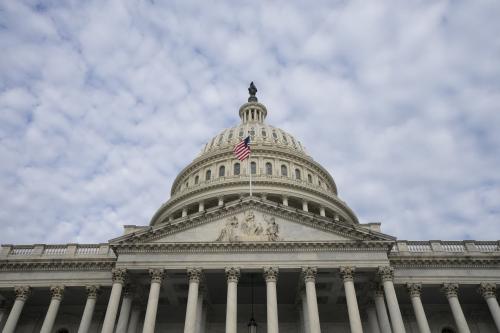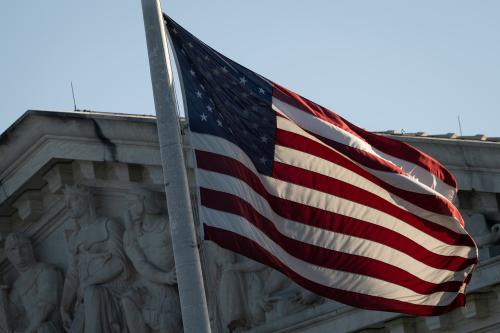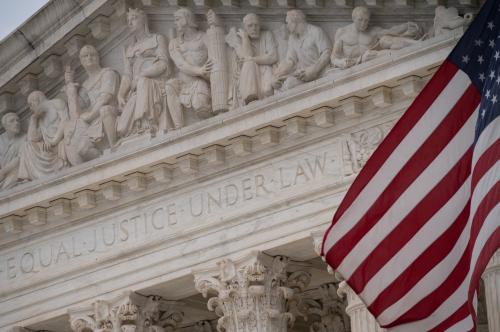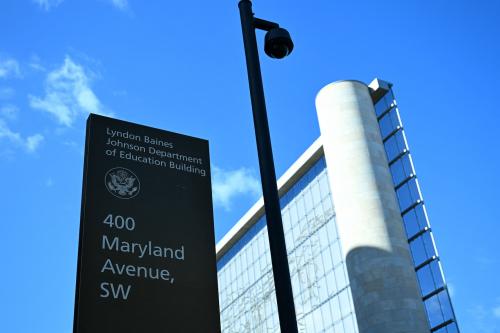This is the final post in a three-part series on democratic decline in the United States. To learn more, see the first post in this series, “Four things to know about democratic erosion” and the full report, “Understanding democratic decline in the United States.”
In recent posts, I have discussed the erosion of voting rights and threats to election integrity in the United States. In this post, I’d like to focus on another form of democratic backsliding in the United States that gets less attention: executive aggrandizement.
Executive aggrandizement is the political science jargon that describes when a leader expands his power beyond the “checks and balances” provided by the legislature and the judicial system or interferes with the independence of the civil service. Even a legitimately elected leader can undermine democracy if they consolidate power or use government resources to debilitate their political opposition.
To an unprecedented degree, the Trump administration and its allies sought to delegitimize, incapacitate, and politicize the independent civil service. Officials in the Justice Department, the Centers for Disease Control, the National Oceanic and Atmospheric Administration, state and local election offices, and other government agencies were pressured, threatened, even fired, and independent research, investigations, and assessments were altered to comport with the claims and preferences of the administration. Shortly before the 2020 election, President Trump released an executive order, “Schedule F,” intended to give him the authority to fire as many as 50,000 career civil servants. Preparations are underway to continue this process of power consolidation under a future Republican president, whether or not that president is Trump.
It is important to recognize that these efforts do not merely undermine quality governance, they endanger democratic functioning. That might seem counterintuitive: How can protections for career bureaucrats against the desires of an elected president be democratic?
For one, government agencies collect and release vitally important data that citizens use to assess whether politicians are doing a good job. Voters need access to unbiased information about the economy, public health, public spending, and all the other issues that should affect their votes. Politicians simply cannot be allowed to shade or alter data to favor their party or to disguise their failures.
In addition, election integrity is threatened if incumbents can weaponize the provision of government services or government jobs for partisan ends. Anyone familiar with the history of big-city machine politics can attest to the dangers of patronage and corruption to free and fair elections. It is deeply anti-democratic for government institutions to become de facto arms of the ruling party.
In other words, democracy is a repeat game. Winning one election does not free elected officials to tilt the playing field so much that they win again. One part of keeping a level playing field is ensuring that incumbents cannot mobilize the immense power of the government to stay in office. Democracy requires an independent civil service.
The primary bulwarks against executive aggrandizement are the legislature and the judiciary.
Unfortunately, Congress has become increasingly dysfunctional. To take only the most recent example, the House of Representatives has spent weeks at a standstill because the Republican caucus has repeatedly failed to elect a Speaker — an unprecedented form of chaos in an institution that has seen its power to effect positive change persistently eroded by gridlock and inertia. At the same time, hyper-partisanship has eroded the interest of legislators in investigating intra-party malfeasance. Republicans in Congress (with a few important exceptions) have tolerated or supported President Trump’s election subversion efforts. The legislature is poorly positioned to check expansions of executive authority.
The power of the judiciary, by contrast, has notably expanded in recent years. In this arena, there is some good news. On questions of executive aggrandizement, the courts, including many very conservative judges, issued a long string of defeats to the Trump Administration. On matters of administrative law, Trump lost nearly 80% of the time. But this was, legal observers agree, in large part because the administration evinced a startling disregard for even basic aspects of legal and administrative process. It is not obvious that Trump’s pattern of defeat would be repeated under a more procedurally competent administration. Scholars have suggested that the Supreme Court seems inclined to approve a much broader scope of presidential authority over the civil service.
Given the dysfunction in Congress and the current ideological makeup of the courts, there are reasons to worry about executive aggrandizement in the United States. This is not to say every expansion of presidential authority is intrinsically problematic. But there are reasons to be concerned about the potential for dangerous levels of executive aggrandizement in the years to come. The health of democracy is not just an election-year issue.
The Brookings Institution is committed to quality, independence, and impact.
We are supported by a diverse array of funders. In line with our values and policies, each Brookings publication represents the sole views of its author(s).








Commentary
Democratic erosion: The role of executive aggrandizement
October 30, 2023